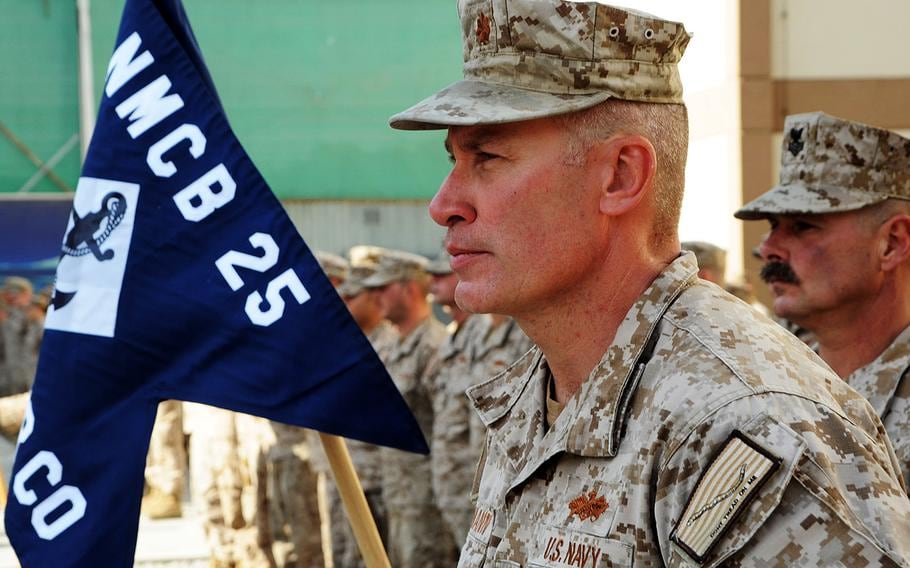JOINT BASE SAN ANTONIO, Texas ― At a time when less than 30 percent of American youth are qualified to join the military ― and less than 1 percent are even interested ― the Pentagon’s top official wants to know whether decades-old accessions standards are still serving the force well.
Those include the Armed Services Vocational Aptitude Battery, a standardized test that measures language, math and other skills, as well as a long list of medical conditions that wholesale bar some prospective recruits from joining up.
“I think we disqualify very capable people for not very compelling reasons,” Defense Secretary Mark Esper told Air Force officials Tuesday during a trip to Lackland Air Force Base to visit the service’s basic military training.
As long as someone is generally healthy, fit and motivated to serve, he said, an ambiguous medical history or low scores on a multiple-choice test shouldn’t prevent them.
Esper asked a handful of training and medical leaders for their feedback on accessions standards Tuesday, part of an informal look at possible future updates.
He called out the ASVAB in particular, which can not only determine someone’s fitness to enlist, but can limit their options in terms of jobs they can do in the military.
“Depending on the [military occupation specialty] you’re going into, I’m not sure of the relevancy of some of those questions on the test,” he said.
The former infantry officer and Army secretary has been doing a tour of military initial entry training facilities over the past few weeks, first visiting Marine Corps Recruit Depot Parris Island, South Carolina, in late May, then heading on to Fort Leonard Wood, Missouri, and Naval Station Great Lakes, Illlinois, on Wednesday.
In 2018, Esper tightened Army recruiting standards by capping Category 4 recruits ― those with low ASVAB scores, for example ― to 2 percent of new enlistees. He also relaxed accessions standards, allowing recruits with a history of self-mutlation or marijuana use to join the Army, as long as the incidents were one-time-only and occured years prior to joining.
He also turned an eye toward some treatable or manageable medical conditions, like eczema and poor eyesight, which Army department policy could have opened up for more waivers.
RELATED

Defense Department-wide, medical accessions standards include hundreds of disqualifying conditions, as well as “history of” situations. Those include everything from some past eye surgeries to seeking help for anxiety or depression as a teenager, a time when many young people are wracked with those feelings.
“I think we need to be better at making recommendations and not rigorously adhering to policy and excluding people that might have something that would prevent them from serving, but they would be a difference-maker in the national defense strategy,” Maj. Gen. John DeGoes, who commands the 59th Medical Wing at Lackland, told Esper.
Not every one of those conditions is a liability or a ticking time bomb, and for the sake of bringing in as much talent as possible, it could be worth looking at them on a case-by-case basis. Especially when some disqualifiers, like undocumented behavioral health or untreated eczema, are so easy to overlook or lie about ― but then might resurface years into a military career.
“A medication that they took when they were 6 years old — boom ― automatically taken out,” Senior Enlisted Adviser to the Chairman Ramon Colon-Lopez said.
The bulk of each service is made up of first-term enlistees, and turning them away can leave a lot of potential on the table.
“I’m just trying to get an airman to serve four years honorably,” Maj. Gen. Andrea Tullos, who commands 2nd Air Force, told Esper. “So I’m not necessarily trying to produce the F-35 pilot who’s going to be serving 10 or more.”
For example, something like a history of childhood psoriasis could be evaluated for how often it flares up, how debilitating the flares are and how difficult they are to manage.
“I think we need to move to risk management,” DeGoes said. “We make recommendations, commanders — you decide.”
Meghann Myers is the Pentagon bureau chief at Military Times. She covers operations, policy, personnel, leadership and other issues affecting service members.




